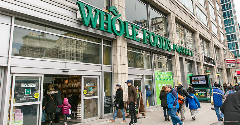News
Cycloponics to expand organic farming facilities in French car parks
9 Apr 2020A French subterranean agriculture startup launched its first funding round last November and raised almost double the investment that was requested. When Cycloponics launched on Lita.co, a platform for investment in sustainable companies, the company hoped to raise €500,000. As of April 8, it had raised €950,800, 110% of which was from individual contributors.
This underground urban farm operates in Paris and cultivates mushrooms, strawberries, lettuce and microgreens in abandoned parking garages using hydroponic agricultural techniques. The startup launched in the French capital in 2016 with the goal of producing 30 metric tons of fruit and vegetables and 24 metric tons of mushrooms in 3,500 square meters of abandoned underground parking.

The euros received from this investment will go toward the company’s expansion as it looks to rehabilitate other abandoned urban sites for crop cultivation. Euractiv reports that Cycloponics recently won bids to expand its project into two other car parks in the 19th arrondissement of Paris.
Funds will also support an increase in vendor capabilities for the produce the company cultivates. Cycloponics delivers fresh organic produce daily with its fleet of cargo bikes. It also sells directly to restaurants and at markets.
Despite raising nearly a million euros to increase its access to abandoned real estate, Euractiv reports the company already has excess space in the abandon parking garage it has repurposed. To fill up the unused footprint, Cycloponics shares the premises with other sustainable agricultural startups, including a Norwegian fishmonger that produces Arctic sea urchins in aquariums and other hydroponic agricultural projects.
The farming startup currently operates in a space called La Caverne (The Cave) and grows its produce on the second underground level of the parking structure. Cultivation at that depth allows for plants to benefit from an autumnal-like environment year-round and limits the pests that can damage crops. It also requires techniques such as vertical farming; climactic engineering through the use of LED lights and thermal regulation; nutrient-rich hydroponic tanks that replace traditional dirt and permit denser cultivation; and the use of substrates and compost to encourage fungi growth.
According to the company website, the goal is to create nutritional hubs in urban neighborhoods to bring people closer to their food. Although Cycloponics currently only cultivates less than 4,000 square meters of space, French publication Le Monde estimates that there are 80 hectares of rooftop space and nearly 770 hectares of limestone quarry are available to be transformed into food production sites.
Related news

PepsiCo formulates ‘naked’ Cheetos and Doritos products
31 Dec 2025
US food giant PepsiCo has launched its Simply NKD range, a move it says reimagines its popular products with new formulations free from artificial flavours, dyes, and colours.
Read more
Debate over ban on ‘meaty’ names for plant-based products reaches stalemate
26 Dec 2025
The debate over a ban on plant-based products using “meaty” terms has reached a stalemate, leaving manufacturers in limbo and still facing overhauls to their marketing and packaging.
Read more
Has ‘clean’ had its day?
22 Dec 2025
Wielding clean-label positioning and fortification as marketing levers is a dangerous strategy, and brands would be better off explaining the hows and whys of the ingredients in their products, say experts.
Read more
Pioneers of circular plastic packaging push for new policies
18 Dec 2025
Some of the world’s largest food and drink companies have grown frustrated at investing in circular packaging systems, as the majority “wait on the sidelines”.
Read more
Whole Foods Market forecasts fibre frenzy for 2026
11 Dec 2025
Whole Foods Market has released its top 2026 trends, predicting that a fibre frenzy will take place next year as health-conscious consumers seek out nutritious, filling options.
Read more
Sorghum emerges as better-for-you hero ingredient
9 Dec 2025
With the launch of Novak Djokovic’s sorghum-based brand, the grain’s popularity in the better-for-you snacking sphere is on the rise, thanks to its nutritional and sensory properties.
Read more
Innovation promise in 'maturing' plant-based dairy alternatives market
8 Dec 2025
Plant-based dairy is a maturing market that still faces significant hurdles around taste, functionality, nutrition, and price, but industry is innovating fast, according to experts speaking at Fi Europe.
Read more
Turning global trade challenges into opportunities
4 Dec 2025
While our food innovation ecosystem is in a healthy place, certain barriers persist. A panel of experts at Fi Europe shared their ideas and strategies for overcoming these, to fully unleash Europe’s potential.
Read more
Celebrating the winners of the Fi Europe Innovation Awards 2025
3 Dec 2025
Food industry stakeholders celebrated as the winners of the Fi Europe Innovation Awards were announced at a ceremony in Paris.
Read more
Yuka’s food scanning app helps consumers make healthier choices
2 Dec 2025
Global food scanning app Yuka helps consumers understand the content of their shopping baskets and shapes producers’ reformulation plans.
Read more